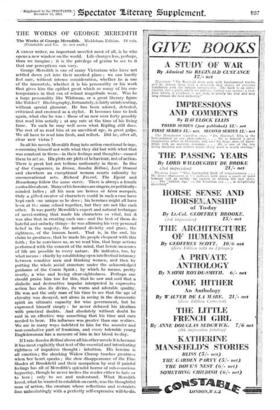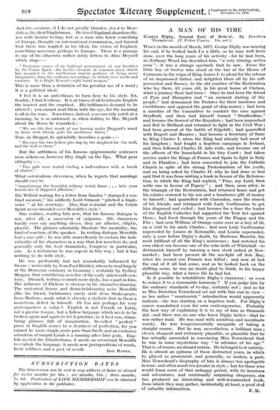THE WORKS OF GEORGE MEREDITH
A GREAT writer, an important novelist most of all, is he who opens a new window on the world. Life changes less, perhaps, than we imagine ; it is the privilege of genius to see to it that our perceptions can vary.
George Meredith is one of many Victorians who have not settled down yet into their merited place ; we can hardly feel sure, without intense consideration, whether he is one of the immortals, whether it is his personality or his work that gives him the epithet great which so many of his con- temporaries in that era of robust magnitude wear. Was he a large personality like Whitman, or a great literary figure like Tolstoi ? His biography, fortunately, is fairly uninteresting, without special glamour. He has been adored, detested, criticized and crowned as a stylist. It becomes time to look again, what else he was : those of us now over forty possibly first read him serially ; at any rate at the time of his living fame. To such he may well seem what Kipling still does. The rest of us read him at an uncritical age, in great gulps. We all have to read him fresh, and reflect. Did he, after all, clear new vistas ?
In all his novels Meredith flung into action emotional beings, concerning himself not with what they did but with what that was constant in them—in their feelings and thoughts—caused
them to act so. His plots are plots of behaviour, not of action.
There is great but not tedious uniformity in them. In One of Our Conquerors, in Diana, Sandra Belloni, Lord Omani and elsewhere an exceptional woman courts calamity by unconventional acts. Richard Feverel, The Egoist and Beauchamp follow the same curve. There is always a female cordonbleu about. Many of his-heroines are singers, orpolitically- minded ladies ; all his men arc heroes or heros mangoes. Only a gifted creator of characters could in such a case have kept each one unique as he does ; his heroines might all have been at the same school together, but they are not like each other. It was partly Meredith's expert and natural technique of novel-writing that made his characters so vital, but it was also that in creating each one—and the best of them do hateful and unlucky things—he was affirming his very personal belief in the majesty, the • natural divinity and grace, the rightness, of the human heart. That is, in the end, his claim to greatness, that he made his people eloquent with this faith ; for he convinces us, as we read him, that large actions performed with the consent of the mind, that heroic measures of life are possible to every nature. He indicates, too, by what means : chiefly by establishing open intellectual intimacy between sensitive men and thinking women, and then by putting the whole social structure under the acknowledged vidance of .the Comic Spirit ; by which he means, pretty nearly, a wise and loving clear-sightedness. Perhaps one should praise him too for this, that he saw and said that a diabolic and destructive impulse interpreted in expressive action has also its divine, its warm and adorable quality. He was not the. only man of his time to see that the age of chivalry was decayed, not alone in seeing in the democratic spirit an ultimate capacity for wise government, but he expressed- himself simply : he never debased his idealism with practical doubts. And absolutely without doubt he said in -an effective way something that his time and ours needed to hear. His influence was greater than one realizes. We are in many ways indebted to him for the sounder and non-combative part of feminism, and every tolerable young Englishwoman has a measure of him in her blood to-day.
If I rate Sandra Belloni above all his other novels it is because 'it has most explicitly that text of the essential and intoxicating rightness of impulsive thought : intuition. His heroine is all emotion ; the shocking Widow Chump touches greatness when her heart speaks ; the slow disappearance of the Fine Shades at Brookfield and their usurpation by real if painful feelings has all of Meredith's splendid horror of sub-conscious hypocrisy, though he never incites the reader either to hate or to love ; only to see and understand. What Meredith loved, what he wanted to establish on earth, was the thoughtful man of action, the creature whose reflections and restraints fuse unhesitatingly with a perfectly self-expressive will-to-do. And this creature, if I do not greatly blunder, stood to Mere- dith as the ideal Englishman. He loved England abandonedly,
not with insular feeling, but as a man who knew something of Europe, thought on international communion, and fancied that there was implicit in his ideal, his vision of England, something necessary perhaps to Europe. There is a passage in one of his otherwise rather sickly letters to Alice Meynell which rings :-
"Restraint comes of an habitual government of our faculties by the _Comic Spirit—the livelier element of common-sense, which has mounted to the intellectual station perforce of being more imaginative than the ordinary assemblage in debate over needs and customs. It is Right Reason's right hand weapon."
This is more than a definition of his peculiar use of a word ; it is a political ideal.
I feel it is an anti-climax to turn here to his style, for, frankly, I find it-odious. It is at times of all bombastic English the loudest and the emptiest. His brilliancies demand to be
uttered ; you cannot read them with the eye, for the meaning is all in the tone. Sometimes, indeed, you can only catch at a meaning, he is so awkward, as when writing to Mrs. Meynell about the Boers he remarked :— ".Wo see the first result of our turning under Haggard's wand to beast with bloody jaws for auriferous Africa."
True, in Shagpat, he splendidly describes a genie :- " His eyes like two hollow pits dug by the shepherd for the wolf, and the wolf in them."
But the artfulness of his famous epigrammatic sentences soon sickens us, however they tingle on the lips. What poor obliquity :— " Two girls were seated circling a half-embrace with a brook of chatter."
What ostentatious cleverness, when he regrets that marriage should ever be -
"transforming the beautiful solitary vestal flame . . . into your hearth-fire of slippered affection."
His Wilfrid waiting for a letter from Sandra " stamped a sen- tinel meatire," his soldierly Lord Ormont " pitched a bugle- voice " at his secretary. Alas, that restraint and the Comic Spirit never brooded over Meredith's style !
One realizes, reading him now, that his famous dialogue is not, after all, a succession of epigrams. His characters hardly ever say anything clever, they are allusive, elliptic, playful.- The phrases admirably illustrate the mentality, the kind of reaction, of the speaker. In writing dialogue Meredith had a rare gift : he was able marvellously to sustain the indi- viduality of his characters in a way that few novelists do, and generally only the best dramatists, Congreve in particular, can. As a technician he was superb in this way ; but it has nothing to do with style.
He was profoundly but not remarkably influenced by Sterne : noticeably by Jean Paul Richter, whom he read largely at the Moravian seminary in Germany ; certainly by Sydney Morgan, that scintillating novelist of the early nineteenth cen- tury. Disraeli, writing so much more dryly, has a part in him. The influence -of Dickens is obvious in his character-drawing. The oratorical frenzy and drum-belabouring noise Meredith (like his friend, Swinburne) surely stole from Shakespeare, from Marlowe, made what is already a stylistic flaw in them a monstrous defect in himself. Or has not perhaps his very grotesqueness a value ? English is not French or Latin, not a precise tongue, but a fallow language which needs to be
broken again and again to let it produce, as it best can, stimu- lating phrases full of imagination. So-called " perfect "
prose in English comes to a deadness of perfection, for you cannot be more simple, more pure than Swift, and an exclusive adoration of insipid Lamb is a running after false gods. Eng- lish needed the Elizabethans, it needs an occasional Meredith to explode the language, it needs new juxtapositions-of words,



























































 Previous page
Previous page